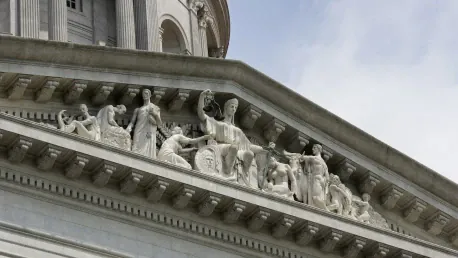On Monday, the Indian Parliament is set for crucial deliberations on financial and banking reforms. The Lok Sabha, the lower house, will focus on Union Finance Minister Nirmala Sitharaman, who is scheduled to present The Finance Bill, a pivotal document for finalizing the central government’s financial proposals and budgetary allocations for the fiscal year 2025-2026. Simultaneously, in the Rajya Sabha, Sitharaman is expected to seek approval for The Banking Laws (Amendment) Bill, 2024, a critical piece aimed at overhauling existing financial frameworks.
Financial Reforms in Lok Sabha
Presentation of The Finance Bill by Nirmala Sitharaman
A main highlight in the Lok Sabha will be Union Finance Minister Nirmala Sitharaman’s presentation of The Finance Bill. This bill serves as an annual financial agenda, outlining the central government’s revenue and expenditure plans for the year. It is integral in shaping policies that impact the economic landscape of India. The Finance Bill not only proposes new tax measures but also seeks necessary amendments to existing laws to ensure smooth fiscal management. The successful passage of this bill is vital for the government’s financial health.
Furthermore, the Lok Sabha’s agenda includes updates from Union Minister Pankaj Chaudhary on the Standing Committee on Finance’s first report concerning the Demands for Grants for the fiscal year. This report is essential in providing insights into budgetary allocations for various sectors, guiding future financial planning and the prioritization of governmental initiatives. The detailed discussions on these grants will illuminate the government’s focus areas and the rationale behind the allocation of funds.
Impacts of The Financial Proposals
Apart from the significant financial directives, the Lok Sabha will also witness a presentation by Union Minister Pankaj Chaudhary, detailing amendments in banking laws. These proposed changes are set to revamp regulations governing financial institutions. In parallel, Suresh Gopi, a relevant minister, will present updates on the recommendations from the 364th Report of the Standing Committee on Transport, Tourism, and Culture, specifically focusing on the Ministry of Tourism’s activities. These updates ensure that past recommendations are being effectively implemented, contributing to the overall development of various sectors.
On the other hand, Harsh Malhotra from the Ministry of Corporate Affairs will provide an update on corporate affairs, which is expected to address corporate governance and compliance issues. Faggan Singh Kulaste and Vishnu Dayal Ram will subsequently present the Standing Committee’s third report on the welfare of Scheduled Castes and Scheduled Tribes. This presentation will specifically cover the reservation policy in Delhi and strategies for socio-economic advancements in these communities, highlighting the government’s inclusive approach toward development.
Banking Legislation in Rajya Sabha
Amendments to The Banking Laws
In the Rajya Sabha, Finance Minister Nirmala Sitharaman is poised to present The Banking Laws (Amendment) Bill, 2024. This bill proposes amendments to seminal legislations, including the Reserve Bank of India Act, 1934, and the Banking Regulation Act, 1949. The primary objective is to enhance oversight and streamline banking operations. The proposed amendments are designed to bolster the banking sector’s stability while ensuring robust regulatory mechanisms that can adapt to evolving economic conditions. These changes are expected to have profound implications for financial institutions, influencing their operational procedures and governance structures.
Union Minister Pankaj Chaudhary, who introduced the bill, aims to address lacunae in the regulatory framework and incorporate global best practices to strengthen India’s banking system. These amendments stand to potentially reshape the financial landscape, ensuring that Indian banks are better equipped to handle future crises and contribute more effectively to economic growth. The passage of this bill by both houses is crucial for the implementation of these much-needed reforms.
Oilfields and Energy Sector Regulations
Alongside the banking amendments, the Rajya Sabha will deliberate on the Oilfields (Regulation and Development) Amendment Bill, 2024. Presented by Minister Hardeep Singh Puri, this bill aims to modernize regulations governing oilfield operations and development. The proposed amendments, initially passed and subsequently returned with further changes by the Lok Sabha, highlight the government’s commitment to refining energy sector regulations. This deliberation intends to facilitate more efficient extraction and utilization of oil resources, ensuring that the sector operates smoothly within an updated legal framework. Enhancing oilfield regulations could attract more investments, fostering growth in India’s energy sector.
A Multi-Faceted Approach to Development
The focus of the parliamentary schedule extends beyond financial and banking reforms, touching on various sectors that are pivotal for holistic development. Presentations and reports on tourism, corporate affairs, and welfare schemes indicate a broad and inclusive policy approach. By ensuring that previous committee recommendations are implemented, the government demonstrates accountability and a commitment to continual progress across multiple domains.
Future Considerations
On Monday, the Indian Parliament will engage in significant discussions on financial and banking reforms. The Lok Sabha, which is the lower house of Parliament, will concentrate on Union Finance Minister Nirmala Sitharaman, who is slated to present The Finance Bill. This crucial document outlines the central government’s financial proposals and budget allocations for the fiscal year 2025-2026. Meanwhile, simultaneous debates will occur in the Rajya Sabha, the upper house. In this assembly, Sitharaman is anticipated to seek ratification for The Banking Laws (Amendment) Bill, 2024. This vital legislation aims to transform the current financial structures to enhance efficiency and regulatory mechanisms. These proposed reforms are fundamental to India’s economic strategy, intending to spur growth, streamline financial processes, and ensure robust oversight. The discussions and decisions made during this parliamentary session will have lasting impacts on India’s fiscal landscape and its ability to adapt to global economic trends.









